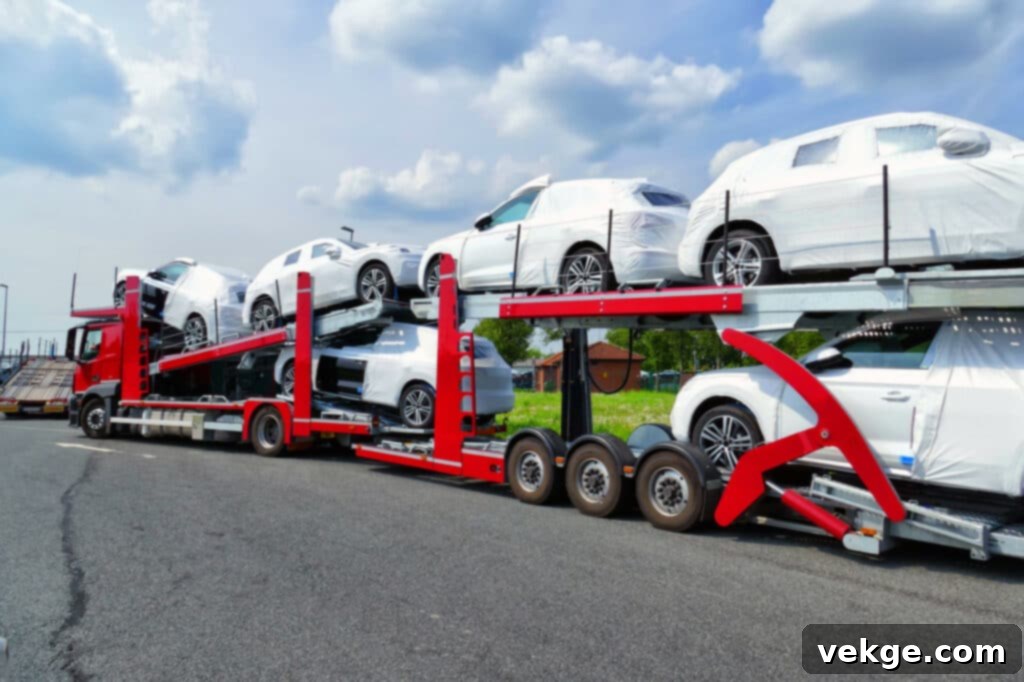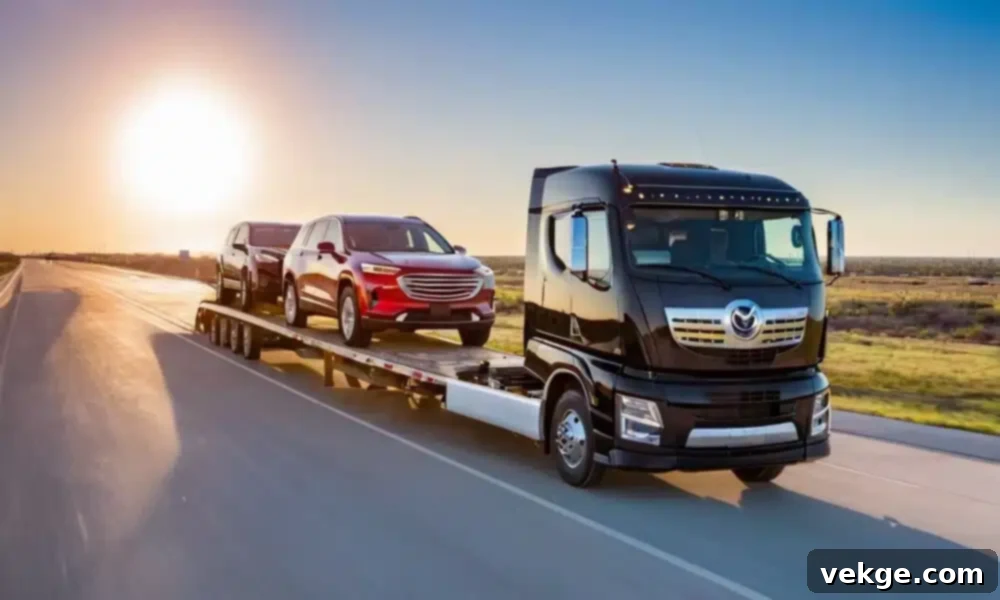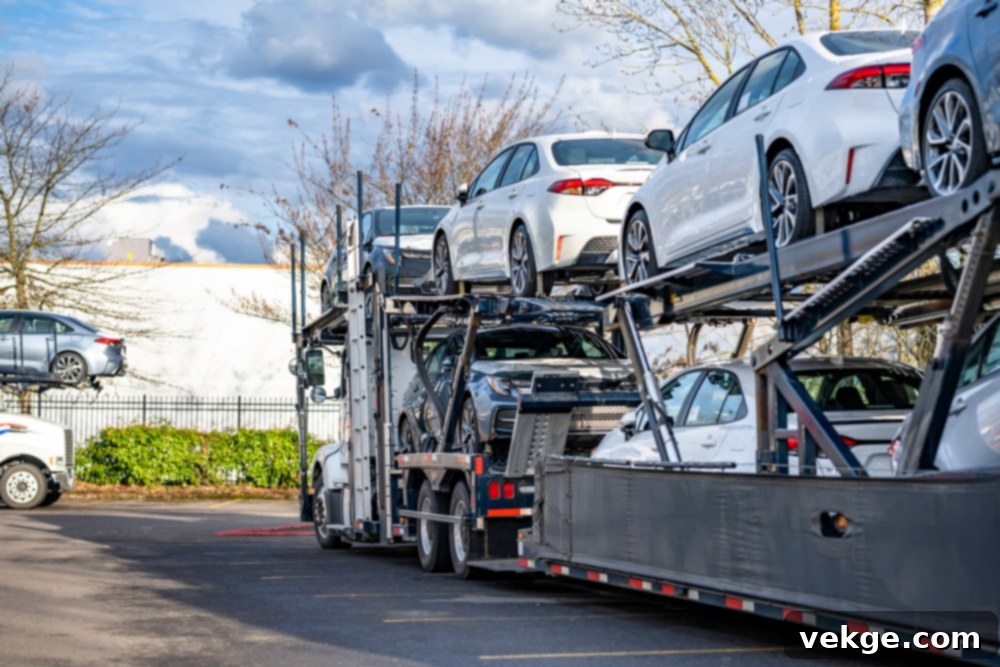Expert Guide to Car Shipping: Making Your Vehicle Relocation Stress-Free
Moving to a new place is an exciting adventure, yet it often comes with a unique set of challenges. Among the most significant concerns for many individuals is the reliable transportation of their vehicle. To demystify this process and provide actionable advice, we’ve compiled a comprehensive guide based on expert insights from A1 Auto Transport, a recognized leader in the automotive transport industry. Here, they answer common questions about shipping cars during relocation, ensuring you’re well-equipped for a smooth experience.
Understanding the Basics of Vehicle Relocation
Why Choose Professional Car Shipping Over Driving?
According to A1 Auto Transport, opting for professional car shipping, especially for long-distance relocations, offers significant advantages over driving your vehicle yourself. While the idea of a road trip might sound appealing, the reality often involves considerable stress, fatigue, and hidden costs.
Firstly, professional auto transport saves you valuable time. Instead of spending days or even weeks on the road, you can dedicate your energy to other crucial aspects of your move, like settling into your new home or starting a new job. This convenience factor is invaluable for busy individuals and families.
Secondly, long drives inevitably lead to increased wear and tear on your vehicle. High mileage, potential exposure to adverse weather conditions, and the risk of road hazards can result in unexpected maintenance issues or even accidents. By entrusting your car to professionals, you mitigate these risks and preserve your vehicle’s condition.
Finally, a thorough cost comparison often reveals that shipping can be more economical. When you factor in fuel expenses, overnight accommodations, meals, potential vehicle servicing, and even the cost of your time, shipping often emerges as a more cost-effective and practical solution. It allows you to focus on the excitement of your new beginning while experts handle the logistics.

What Types of Car Shipping Services Are Available?
A1 Auto Transport primarily offers two main types of car shipping services to cater to diverse needs and budgets: open transport and enclosed transport.
Open transport is the most common and budget-friendly option. Vehicles are transported on an open trailer, similar to those you see carrying multiple new cars to dealerships. This method is highly efficient for moving standard vehicles in bulk, making it a popular choice for everyday sedans, SUVs, and trucks. While your vehicle is exposed to the elements and road debris, the safety record of open carriers is exceptionally high due to secure strapping and professional handling.
Enclosed transport provides an enhanced level of protection. In this service, your vehicle is transported within a fully enclosed trailer, shielding it completely from weather conditions, road grime, and potential debris. This premium option is highly recommended for high-end, luxury, classic, antique, or custom cars, as it ensures they arrive at their destination in pristine, showroom condition. The added security and peace of mind make it the preferred choice for owners of vehicles with significant financial or sentimental value.
How Does the Car Shipping Process Work? What Should Customers Expect?
The car shipping process, when handled by a reputable company like A1 Auto Transport, is designed to be straightforward and transparent. It typically begins with obtaining a detailed quote, which is calculated based on factors such as the distance of the shipment, the type of vehicle, and the chosen service (open or enclosed transport).
Once you accept the quote, you’ll schedule a convenient pickup date for your vehicle. On the scheduled day, a professional carrier will arrive to inspect your car, note its current condition on a Bill of Lading (BOL), and load it securely onto the transport trailer. The vehicle then begins its journey to the specified destination.
Throughout the entire process, clear and consistent communication from the transport company is paramount. Customers can expect regular updates on their shipment’s progress, often through online tracking systems or direct communication with a dispatcher. This transparency ensures peace of mind, allowing you to track your vehicle’s journey and plan accordingly for its arrival. This streamlined process, coupled with effective communication, contributes significantly to a smooth and stress-free vehicle relocation experience.
For more detailed information and to get a cost estimate tailored to your specific relocation distance and needs, visit A1 Auto Transport’s cost and distance estimator. This valuable resource ensures a transparent and informed decision-making process, allowing you to focus on other aspects of your new life while your car is in trusted hands.
Choosing the Right Vehicle Transport Service
How Do I Choose Between Open and Enclosed Transport?
The decision between open and enclosed transport largely depends on your specific needs, the type of vehicle you own, and your budget. A1 Auto Transport advises clients to consider the following factors:
- Vehicle Type and Value: For standard, everyday vehicles like sedans, SUVs, or trucks, open transport is typically sufficient and offers a cost-effective solution. However, if you own a luxury car, a classic automobile, a custom build, or any vehicle with significant monetary or sentimental value, enclosed transport is highly recommended. The added protection from weather, road debris, and potential theft provides invaluable peace of mind.
- Budget Considerations: Open transport is significantly more affordable due to its efficiency and the ability to carry more vehicles simultaneously. Enclosed transport, offering a premium service, naturally comes at a higher cost.
- Level of Protection Desired: If your priority is maximum protection against all external elements and road hazards, enclosed transport is the clear choice. If minor exposure is acceptable for a standard vehicle to save costs, open transport is a viable option.

By carefully evaluating these points, you can make an informed decision that aligns with both your budget and your vehicle’s safety requirements.
What Factors Affect the Cost of Shipping a Car?
Understanding the various elements that influence car shipping costs is crucial for effective budgeting. A1 Auto Transport highlights several key factors:
- Distance of Travel: This is arguably the most significant factor. The greater the distance between the pickup and delivery locations, the higher the cost.
- Type of Transport Service: As discussed, enclosed transport is more expensive than open transport due to the specialized equipment and enhanced protection it offers.
- Vehicle Dimensions and Weight: Larger and heavier vehicles (e.g., large SUVs, trucks, RVs) require more space and fuel, leading to higher shipping costs. Modified vehicles (e.g., with lift kits, oversized tires) may also incur additional fees.
- Vehicle Operability: Shipping an inoperable vehicle requires special equipment (like a winch or forklift) for loading and unloading, which adds to the overall cost. Always declare if your vehicle is non-running.
- Route Popularity and Seasonality: Shipping costs can fluctuate based on demand. Popular routes (e.g., snowbird routes during winter) and peak moving seasons (summer) often see higher prices.
- Fuel Prices: As with any transportation service, fluctuating fuel prices directly impact the operational costs of carriers, which are then reflected in shipping quotes.
- Pickup/Delivery Location: Door-to-door service (where the carrier picks up and delivers as close as possible to your exact addresses) is generally more expensive than terminal-to-terminal shipping.
A1 Auto Transport emphasizes the importance of providing precise details when requesting a quote to ensure accuracy. By understanding these cost-affecting elements, individuals can make informed choices and plan their car transport budget effectively.
Are There Any Preparations Needed Before Shipping a Car?
Yes, thorough preparation is absolutely essential for a smooth and safe automobile transport experience. A1 Auto Transport strongly advises customers to take several steps:
- Clean Your Vehicle: Wash your car thoroughly. A clean vehicle makes it easier to conduct a precise pre-shipment inspection and identify any existing scratches, dents, or damage.
- Remove Personal Items: This is critical. Car shipping companies are licensed to transport vehicles, not household goods. Remove all personal belongings, valuables, and aftermarket accessories (like GPS devices, toll passes, or removable media). Items left inside are typically not covered by insurance, and extra weight can affect costs.
- Document Existing Damage: Before the carrier arrives, take detailed photos and videos of your car’s exterior and interior from all angles. Note any existing dents, scratches, or imperfections. This documentation serves as crucial proof of your vehicle’s condition prior to shipment.
- Check Fluid Levels and Tire Pressure: Ensure essential fluids (oil, coolant, brake fluid) are at appropriate levels. The gas tank should ideally be no more than a quarter full, as a full tank adds unnecessary weight. Check tire pressure.
- Disable Alarms: Make sure any car alarms are turned off or disabled to prevent accidental activation during transit.
- Provide a Spare Key: Having a spare set of keys readily available simplifies the loading and unloading process for the driver.
- Secure Loose Parts: Fold in side mirrors, retract antennas, and secure any loose aftermarket parts or spoilers to prevent damage.

Following these detailed preparations not only serves as insurance against potential damage but also ensures a stress-free and efficient delivery process for both you and the transport company.
Navigating the Shipping Process with Confidence
How Long Does It Typically Take to Ship a Car, and Can Customers Track the Shipment?
The transit time for car shipping is not uniform; it largely depends on the distance between the pickup and delivery locations, the specific route, the type of service chosen, and current weather conditions. A1 Auto Transport explains that domestic deliveries can range from a few days for shorter distances to one to two weeks for cross-country shipments. International shipments, naturally, tend to take considerably longer, often spanning several weeks or even months due to customs, port schedules, and ocean transit times.
Most reliable vehicle moving firms understand the importance of transparency and peace of mind. Therefore, they offer real-time shipment tracking. This typically includes GPS tracking on the carrier, online tracking portals where you can input your booking number, or direct communication with a dispatcher who can provide updates. This allows customers to monitor their vehicle’s journey and plan for its arrival accordingly.
What Happens in Case of Damage During Transport, and How Is It Handled?
While professional auto transport companies take every precaution, accidents can occasionally occur. A1 Auto Transport stresses the importance of preparedness. Before shipping, meticulously document your car’s condition with photos and videos. This serves as critical evidence if any new damage occurs.
Upon delivery, it is imperative to thoroughly inspect your vehicle before signing the Bill of Lading (BOL). If you notice any new damage, clearly note it on the BOL, take immediate photos, and contact the car transport company without delay. Most reputable companies carry comprehensive insurance coverage to address such situations. They will guide you through the claims process, which typically involves submitting your documentation and proof of damage for assessment and resolution.
Can Customers Ship Personal Items Along with Their Vehicle?
Generally, A1 Auto Transport, like most professional carriers, strongly advises against shipping personal items inside a vehicle. There are several key reasons for this policy:
- Insurance Limitations: Car transport companies are licensed and insured to carry vehicles only. Their insurance typically does not cover personal belongings left inside the car. In the event of loss, theft, or damage to these items, you will not be compensated.
- Weight Restrictions: Added weight from personal items can affect the overall load and fuel efficiency of the transport truck, potentially incurring additional costs or even violating weight regulations.
- Security Risks: Leaving valuable items in your car during transit can attract theft.
It’s always best to remove all personal items before shipment. If you have essential items that must travel with you, consider shipping them separately through a dedicated moving company or parcel service.
Ensuring a Smooth Experience: Tips and Considerations
Can Customers Choose Specific Pickup and Delivery Dates?
A1 Auto Transport strives to be flexible and accommodate specific pickup and drop-off dates whenever possible. However, it’s crucial to understand that the logistics of auto transport involve many variables that can affect schedules. Factors such as weather conditions, road closures, traffic, mechanical issues with the carrier, and regulations on driver hours can sometimes alter initial plans.

Reputable transport companies work closely with clients to set realistic timelines and communicate any potential adjustments proactively. Booking your shipment well in advance increases the likelihood of securing your preferred dates. Open dialogue about your needs and any flexibility you might have is key to a successful scheduling experience.
Are There Any Restrictions on the Types of Vehicles that Can Be Shipped?
Most professional carriers, including A1 Auto Transport, are equipped to handle a wide variety of vehicles, including standard cars, trucks, SUVs, motorcycles, and even certain types of boats or RVs. Nevertheless, there can be restrictions or special requirements for oversized, heavily modified, or inoperable automobiles.
- Oversized Vehicles: Very large trucks, modified vehicles with lift kits, or commercial vehicles may require specialized trailers and can incur higher costs.
- Inoperable Vehicles: While possible to ship, non-running vehicles need extra equipment for loading and unloading (e.g., winches), which must be declared upfront and will affect the quote.
- Modifications: Any significant modifications that alter the vehicle’s standard dimensions or ground clearance should be disclosed to ensure the carrier can accommodate it safely.
- Hazardous Materials: Transport of hazardous materials or illegal items inside the vehicle is strictly prohibited.
It is imperative to provide all relevant and accurate information about your vehicle’s make, model, year, dimensions, condition, and any modifications when requesting a quote. This ensures you receive a suitable service and an accurate estimate.
How Can Customers Prepare for the Vehicle’s Arrival at the Destination?
Preparing for your vehicle’s arrival is just as important as preparing it for shipment. A1 Auto Transport advises customers to be present at the delivery location to inspect the car thoroughly. If you cannot be there personally, designate a trusted adult to act on your behalf and provide them with all necessary instructions and documentation.
Have all necessary paperwork ready, including your copy of the inspection report from pickup and the Bill of Lading. Upon arrival, carefully compare the vehicle’s condition against the pre-shipping inspection report. Check for any new dents, scratches, or damage that may have occurred during transit. Any discrepancies should be noted down immediately on the Bill of Lading before you sign it, and you should take photographs of the damage. This documentation is crucial if you need to file a claim.
Addressing Potential Concerns
What Happens if a Vehicle Is Delayed or Doesn’t Arrive on the Scheduled Date?
While reputable auto transport companies strive for timely deliveries, delays, though uncommon, can occur due to unanticipated events. A1 Auto Transport assures clients that in such situations, open and honest communication is critical. Delays can be caused by factors like severe weather, unexpected road closures, traffic incidents, mechanical issues with the transport truck, or even unforeseen routing adjustments.

If your vehicle is delayed, the transport company should proactively update you with a new estimated time of arrival and explain the reason for the delay. It’s important to maintain open dialogue and reach out if you haven’t received an update. Reputable firms will work diligently to address any immediate apprehensions and keep you informed every step of the way.
How Can Customers Verify the Credibility of a Car Shipping Company?
Verifying the credibility of a car shipping company is paramount to a successful and stress-free experience. A1 Auto Transport emphasizes that research is key:
- Read Customer Reviews: Look for reviews on independent platforms like Google, Yelp, the Better Business Bureau (BBB), and industry-specific forums. Pay attention to both positive and negative feedback and how the company responds to issues.
- Check Licensing and Insurance: Verify that the company is properly licensed by the Federal Motor Carrier Safety Administration (FMCSA) and has valid cargo insurance. You can often check their USDOT and MC numbers on the FMCSA website.
- Examine Their Track Record: A company with a long history and positive reputation in the industry is generally a safer bet.
- Transparency: Reputable companies are transparent about their services, pricing, terms and conditions, and communication throughout the shipping process. Avoid companies with vague quotes or high upfront deposits.
- Get Multiple Quotes: Compare quotes from several companies, but don’t just choose the cheapest. A significantly lower price might indicate hidden fees or substandard service.
Are There Any Tips for a Seamless Car Shipping Experience?
To ensure the smoothest possible car shipping experience, A1 Auto Transport offers these invaluable tips:
- Choose Wisely: Invest time in researching and selecting a reliable, experienced, and reputable auto transporter. Don’t compromise on quality for a slightly lower price.
- Provide Accurate Information: Be precise and honest about your vehicle’s details, including its make, model, year, dimensions, condition (operable/inoperable), and any modifications.
- Follow Preparation Instructions: Adhere strictly to all preparation guidelines provided by the shipping company, especially regarding personal items, fluid levels, and disabling alarms.
- Document Everything: Take comprehensive photos and videos of your car’s condition before shipment. Keep copies of all paperwork, including the Bill of Lading and any communication.
- Maintain Open Communication: Stay in regular contact with your chosen shipping company. Don’t hesitate to ask questions or request updates via phone calls or emails throughout the process.
- Be Prepared for Delivery: Ensure you or a designated person is available at the delivery location for the final inspection and sign-off.
- Flexibility: Understand that unforeseen circumstances can cause minor delays and approach the process with a degree of flexibility.
Being proactive, well-informed, and prepared will significantly contribute to a stress-free and successful vehicle relocation.
Conclusion: Your Path to Stress-Free Vehicle Relocation
Shipping your car during a relocation might initially seem like a complex and daunting task. However, by arming yourself with the proper knowledge and partnering with a credible and experienced transportation provider like A1 Auto Transport, it can be a remarkably manageable and stress-free part of your move.
The expert advice offered here provides valuable insights into the entire process, from understanding the different types of services available to preparing your vehicle for its journey and navigating potential challenges. By making informed choices, ensuring your vehicle is meticulously prepared, and selecting a reputable company, you can be confident that your car will arrive safely and efficiently at your new destination, allowing you to focus your attention on settling into your new life.
